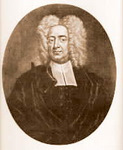Fifty Ancestors of Henry Lincoln Clapp, Parts 1-2 by Henry Lincoln Clapp
Rev. John Lothrop was born at Elton, Yorkshire, Eng., bapt. Dec. 20, 1584; received his degree of B.A. at Cambridge University, Eng., in 1605, and M.A. in 1609; came to New England Sept. 18, 1634, with the famous Ann Hutchinson, in the ship Griffin. In Gov. Winthrop's Journal, under the date Sept. 18, 1634, is this record:
The Griffin and another ship now arriving with about 200 passengers and one hundred cattle, Mr. Lathrop and Mr. Sims, two godly ministers, coming in the same ship.
Mr. Lothrop was the first regularly settled minister of the First Parish in Scituate, consisting of sixty-three members. He took charge of it Jan. 18, 1634-5. He removed to Barnstable with twenty heads of families five years later, Oct. 11, 1639. Among these faithful adherents were Anthony Annable, James Cudworth and Henry Ewell.
In 1616 Mr. Henry Jacob established the first Congregational Church in England, at London, on the plan of Mr. Robinson's at Leyden, he having consulted with him on the subject. Mr. Jacob having removed to Virginia in 1624, Mr. Lathrop became his successor in London. The church held their meetings privately, and escaped the vigilance of their persecutors until April 29, 1632, when they were discovered by Tomlinson, the pursuivant of the Bishop, holding a meeting for religious worship at the house of Mr. Humphrey Barnet in Blackfriars. Forty-two of them were apprehended, and eighteen only escaped.
Mr. Lothrop with others was imprisoned, where he remained until April, 1634 - two full years; and was then set at liberty on condition of departing from the kingdom. He embarked in the ship Griffin for Boston with about thirty of his church and people, and arrived Sept. 18, 1634." (Printed extract in Roxbury Records.)
While he was in prison his wife died, and he was let out long enough to attend her funeral.
The first Thanksgiving Day in this country was celebrated Dec. 22, 1636, in Rev. Mr. Lothrop's Meeting House. The church records run thus:
Beginning some halfe an hour before nine, and continued until after twelve a clocke, ye day being very cold; beginning with a short prayer,
then a psalm sang,
then more large in prayer,
after that another psalm, and the Word taught,
after that prayer,
and then a psalm.
Then (at their homes) making merry to the creatures, the poorer sort being invited by the virtue. (Genealogical Notes of Barnstable Families.)
John Lothrop's father was Thomas Lowthorpe of Cherry Burton, Eng., and his grandfather was John Lowthorpe of Lowthorpe, Yorkshire, Eng.
His second wife was Ann Hammond, daughter of William Hammond of Watertown, Mass., and his wife, Elizabeth Penn, sister of Sir William Penn, according to N. E. H. and G. Register, Vol. 30, p. 29, near the bottom. (Hammonds, p. 47.) He married Ann Hammond, Feb. 17, 1636-7 and had five children, among whom were
Bathsheba born in Barnstable, bapt. Feb. 27, 1641-2, and
Abigail born in Barnstable and bapt. Nov. 2, 1639,
the first record since our coming to Barnstable, Oct. 11, 1639.
He had nine children born in England by a former wife.


